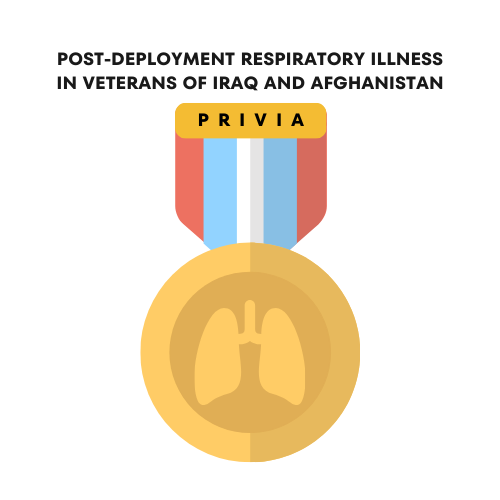Projects
Deployment-Related Respiratory Disease
Post-Deployment Respiratory Illness in Veterans of Iraq and Afghanistan (PRIVIA)
Compared to non-deployed personnel, veterans of post-9/11 conflicts in Iraq and Afghanistan have a higher prevalence of exertional dyspnea and other respiratory symptoms which may relate to exposure to inhalational irritants during deployment.
While many such veterans are ultimately diagnosed with common respiratory diseases, constrictive bronchiolitis (CB) has been reported in up to 78% of veterans with unexplained dyspnea who undergo surgical lung biopsy.

PRIVIA will evaluate long-term outcomes in veterans with deployment-related constrictive bronchiolitis (DR-CB), investigate specific metals which drive ongoing activation of the immune system and lung damage, and rigorously assess cutting-edge diagnostic modalities which may improve our ability to diagnose DR-CB non-invasively.
PRIVIA is funded by the Department of Veterans Affairs and receives programmatic support from Vanderbilt Center for Population Science and Randomized Clinical Trials (V-POLARIS).
Post-Deployment Cardiopulmonary Evaluation Network (PDCEN)

The Nashville VA is one of six sites in the VA’s Post-Deployment Cardiopulmonary Evaluation Network (PDCEN). The PDCEN is a program of the VA’s Airborne Hazards and Burn Pits Center of Excellence and “is committed to clarifying and refining diagnoses, as well as determining their relationship to exposures, by providing comprehensive standardized clinical evaluations."
"Knowledge gained from these evaluations allows the PDCEN to inform care providers on best practices including treatment recommendations, support research efforts, and provide information to various stakeholders to improve the health and care of veterans with military exposures.”
The PDCEN is a clinical and research program funded by the Department of Veterans Affairs.
PDCEN Evaluation in Healthy Adults (PEHA)
This project seeks to recruit civilians and current/former military personnel without respiratory symptoms to undergo a battery of tests similar to veterans with respiratory symptoms treated in the Post-Deployment Cardiopulmonary Evaluation Network (PDCEN). This data is critical for understanding components of the PDCEN workup for which normative population data is not available.
Toxicant-Mediated Pulmonary Hypertension in Southwest Asia Veterans (TOP-HAT)
This project, funded by the Department of Defense, is focused on understanding toxicant-mediated pulmonary hypertension (PH) as a driver of persistent respiratory symptoms in Southwest Asia (SWA) Veterans.
The goals of the project are to:
- Estimate the prevalence and subtype (pre- or post-capillary) of PH in SWA Veterans with unexplained dyspnea
- Determine if toxicant-mediated PH is secondary to pulmonary vascular disease (PVD), cardiac disease, or both
- Define pathologic and biochemical differences between toxicant-mediated PVD and other forms of PVD
- Develop candidate biomarkers for non-invasive diagnosis of toxicant-mediated PH
- Evaluate a potential therapeutic (semaglutide) for prevention or treatment of toxicant-mediated PH in an in vivo model.
Chronic Obstructive Pulmonary Disease
Mechanisms of altered epithelial differentiation in COPD
Existing models of goblet cell hyperplasia (GCH) in chronic obstructive pulmonary disease (COPD) do not fully account for the persistence and heterogeneity of GCH in the lungs of former smokers with COPD.
We are investigating how alterations in the airway stem cells (basal cells) cause them to preferentially differentiate into goblet cells and other cell types which contribute to COPD pathology.